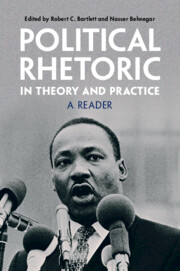Book contents
- Political Rhetoric in Theory and Practice
- Political Rhetoric in Theory and Practice
- Copyright page
- Contents
- Introduction
- Part I What is Rhetoric?
- 1 Classical Foundations
- 2 The Three Kinds of Rhetoric According to Aristotle
- 3 The Modes of Persuasion: Ethos, Pathos, Logos (Character, Passion, Argument)
- 4 Rhetoric and Diction
- Part II Political Rhetoric in Practice
- Index
4 - Rhetoric and Diction
from Part I - What is Rhetoric?
Published online by Cambridge University Press: 02 November 2023
- Political Rhetoric in Theory and Practice
- Political Rhetoric in Theory and Practice
- Copyright page
- Contents
- Introduction
- Part I What is Rhetoric?
- 1 Classical Foundations
- 2 The Three Kinds of Rhetoric According to Aristotle
- 3 The Modes of Persuasion: Ethos, Pathos, Logos (Character, Passion, Argument)
- 4 Rhetoric and Diction
- Part II Political Rhetoric in Practice
- Index
Summary
Aristotle here considers the effect of diction, or word choice, on rhetorical argument. Metaphors, epithets, special dialects, the use of the voice to convey passion or emotion, and the necessary parts of any speech are all considered here.
- Type
- Chapter
- Information
- Political Rhetoric in Theory and PracticeA Reader, pp. 144 - 156Publisher: Cambridge University PressPrint publication year: 2023



